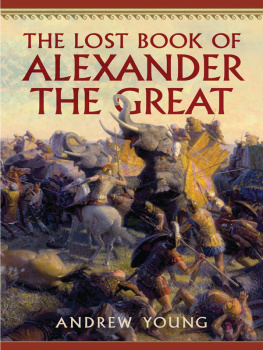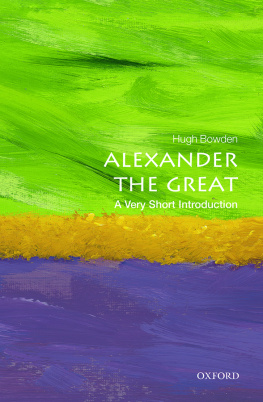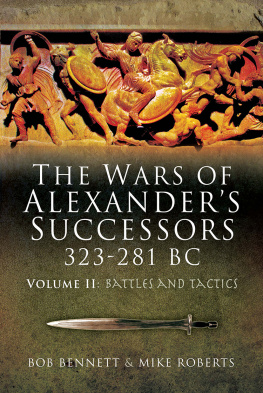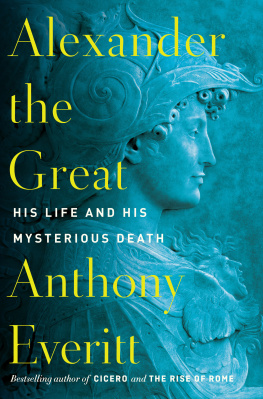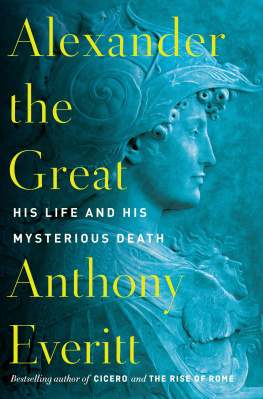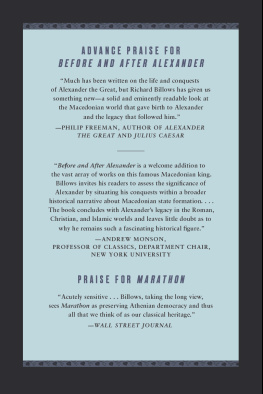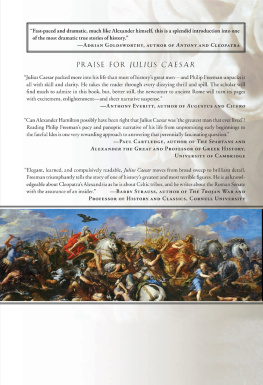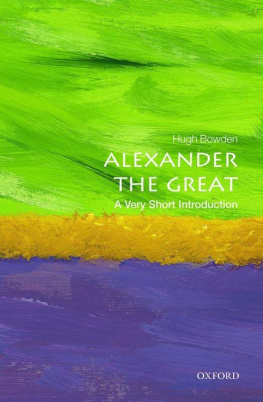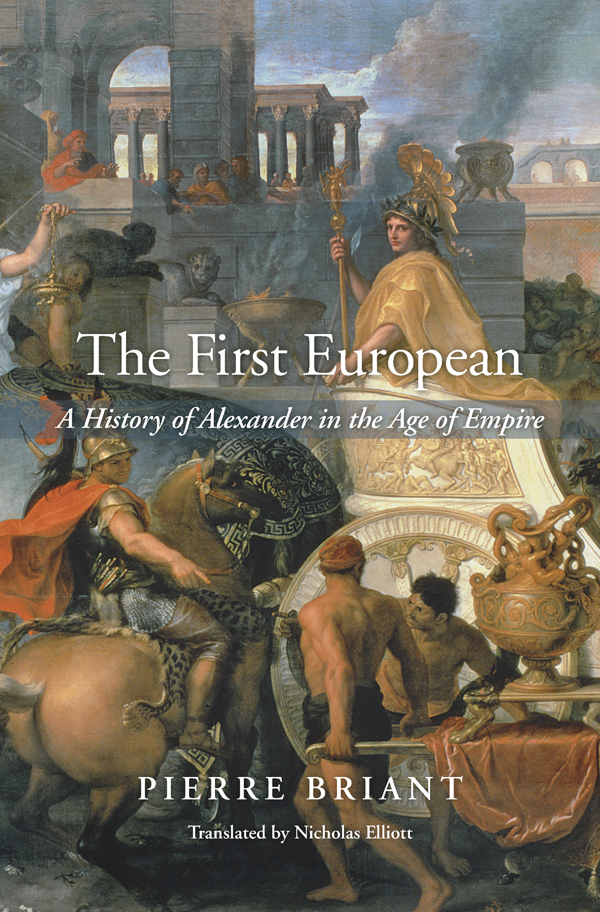Contents
Guide
Pagebreaks of the print version
THE FIRST EUROPEAN
A History of Alexander in the Age of Empire
PIERRE BRIANT
Translated by
Nicholas Elliott


Cambridge, Massachusetts
London, England
2017
Copyright 2017 by the President and Fellows of Harvard College
All rights reserved
First published as Alexandre des lumires: Fragments dhistoire europenne by Pierre Briant Editions Gallimard, Paris, 2012.
Cover design: Annamarie McMahon Why
Cover art: Charles LeBrun (1619-1690), The Triumph of Alexander, or The Entrance of Alexander into Babylon, c. 1673 (oil on canvas) Louvre, Paris, France / Peter Willi / Bridgeman Images
978-0-674-65966-7 (hard cover : alk. paper)
978-0-674-97286-5 (EPUB)
978-0-674-97285-8 (MOBI)
The Library of Congress has cataloged the printed edition as follows:
Names: Briant, Pierre, author.
Title: The first European : a history of Alexander in the age of empire / Pierre Briant ; translated by Nicholas Elliott.
Description: Cambridge, Massachusetts : Harvard University Press, 2017. | First published as Alexandre des lumires. Fragments dhistoire europenne by Pierre Briant Editions Gallimard, Paris, 2012.Title page verso | Includes bibliographical references and index.
Identifiers: LCCN 2016009269
Subjects: LCSH: Alexander, the Great, 356 B.C.323 B.C. | HellenismInfluence. | HellenismHistoriography. | History, AncientHistoriography. | EuropeIntellectual life18th century. | GreeceHistoryMacedonian Expansion, 359323 B.C.Historiography.
Classification: LCC DF234.2 .B74713 2017 | DDC 938/.0707204dc23 LC record available at http://lccn.loc.gov/2016009269
Contents
This book for English readers differs slightly from the volume published in Paris by Gallimard in 2012 under the title Alexandre des Lumires: Fragments dhistoire europenne. Like that one, this volume focuses on the figure of Alexander as First European from the Introduction onward. The books general structure, which is in four parts, is identical. However, in order to conform to the format planned by Harvard University Press, I have trimmed parts of the text, particularly in the first part of the French edition. The first four chapters have been condensed into a single chapter (, with the exception of a few changed details. In the French edition, the numerous quotations were presented in French, including those taken from English and German works, either because I had used preexisting translations or had translated them myself. For this American edition, I have returned to the original texts of those works published in English. I have used English translations of French and German works when they were available, which was most often the case.
Concerning my text in and of itself, the only notable addition is a passage on the representations of Alexander at the court of Philip V of Spain in This comparison does not detract from the specificity of the Alexander of the Enlightenment largely constructed by Montesquieu and those historians and philosophers whom he influenced in England, Scotland, Germany, and France (the four countries at the heart of my investigation), but it serves as a reminder that the use of the Macedonian king as a precedent for European expansion began in Europe in the Middle Ages, including in the context of the Crusades led or imagined against the Infidelsparticularly at the court of the dukes of Burgundy.
Given the proliferation in recent years of studies both partial and innovative,
Now that commerce has connected the entire universe, that politics are enlightened regarding its interests, and that humanity extends to every people, there is no sovereign in Europe who does not think like Alexander.
JAUCOURT, Encyclopdie, 6(1756): 51.
Alexander, Europe, and the Rest of the World from Antiquity to the Enlightenment
An author customarily begins his book by stating its genesis and objectives. This type of explanation is especially necessary when a historian of antiquity writes a book that falls into a historical and cultural context outside his original field of expertisein this case, the Enlightenment or, if you will (I will come back to this), the long eighteenth century.
The direction of my research evolved radically from the initial impulse to the book you hold before you. I initially sought to study the genesis of the modern historiography of Alexander the Great. Some of my findings have been described in a previous volume (Darius in the Shadow of Alexander, 2015) and in preparatory and subsequent articles in which I considered representations of the history of the Achaemenid empire through its intersections with the history of its European conqueror. At this point, I had already decided to continue my research after uncovering a paradoxical gap of which I had initially not suspected the full extent or significance. I found that a moment in this history of history has regularly been undervalued, if not completely eclipsed: the Age of Enlightenment. I decided to rediscover Alexander through the Enlightenment while discovering the Enlightenment through Alexander.
In opening such an approach (which is not as narrow as it may seem), the historian in me is perfectly aware that my method here is an extension of my previous work. Through the figure of Alexander and the vastly differing opinions on his role in history, I have long had a sustained interest in the forms and meaning(s) of the dialogue between the past and the present instrumentalized as mirrors (particularly in European colonial literature), as well as the question of European views of the Orient (which naturally calls to mind Edward Saids Orientalism), including through the analysis of the slow emergence of a Persian history in equal parts, in which Alexander no longer appears as a deus ex machina casting a deep shadow over the history of the Great Kings.
My approach has also been inspired by the growing rediscovery of Aufklrungshistorie initiated by contemporary German historiography, and incorporates an investigation of the writing of history in the Age of Enlightenment not in a global form (that would be another book, which it is not my place to write), but through the examination of a specific case. The example in question was a response to a competition launched by the Acadmie Royal des Inscriptions et Belles-Lettres in 1769, which is all the more remarkable for the fact that it led to the first comprehensive reflection on the sources of the history of Alexander. Submitted by the Baron de Sainte-Croix in 1771 and published in two editions from 1775 to 1804, the Examen critique des anciens historiens dAlexandre clearly raises the central question of the hierarchization of sources. Voltaire had appealed in 1776 for a critical reading of Quintus Curtius Rufuss The History of Alexander and, referring again to the ways of writing the history of the king of Macedon, denounced the modern parrots who repeat ancient words (La Bible enfin explique).
It is important to understand the circle(s) and context(s) in which a critical history of Alexander began to be established as a distinct field in European countries over the course of the long eighteenth century, as well as the methods and perspectives according to which it was developed and the existing movement(s) against which it was formulatedfor it did not come into being without polemics or contradictions. Such an inquiry allows one to tackle a large number of issues, which are not exclusively raised by the historiography of Alexander: these are the links between history, education, and political morality, between critical examination of the sources and historical synthesis, between scholarship, philosophy, and history, between scholarly literature and popular literature, and between text and image. In this sense, my study brings to fruition a suggestion independently made both by Elias Bickerman (19441945) and Arnaldo Momigliano (1952): namely, that the beginnings of the history of Alexander should be situated in the eighteenth century, long before Johann Gustav Droysen (born in 1808) began his university studies in Berlin under eminent professors and went on to publish his


